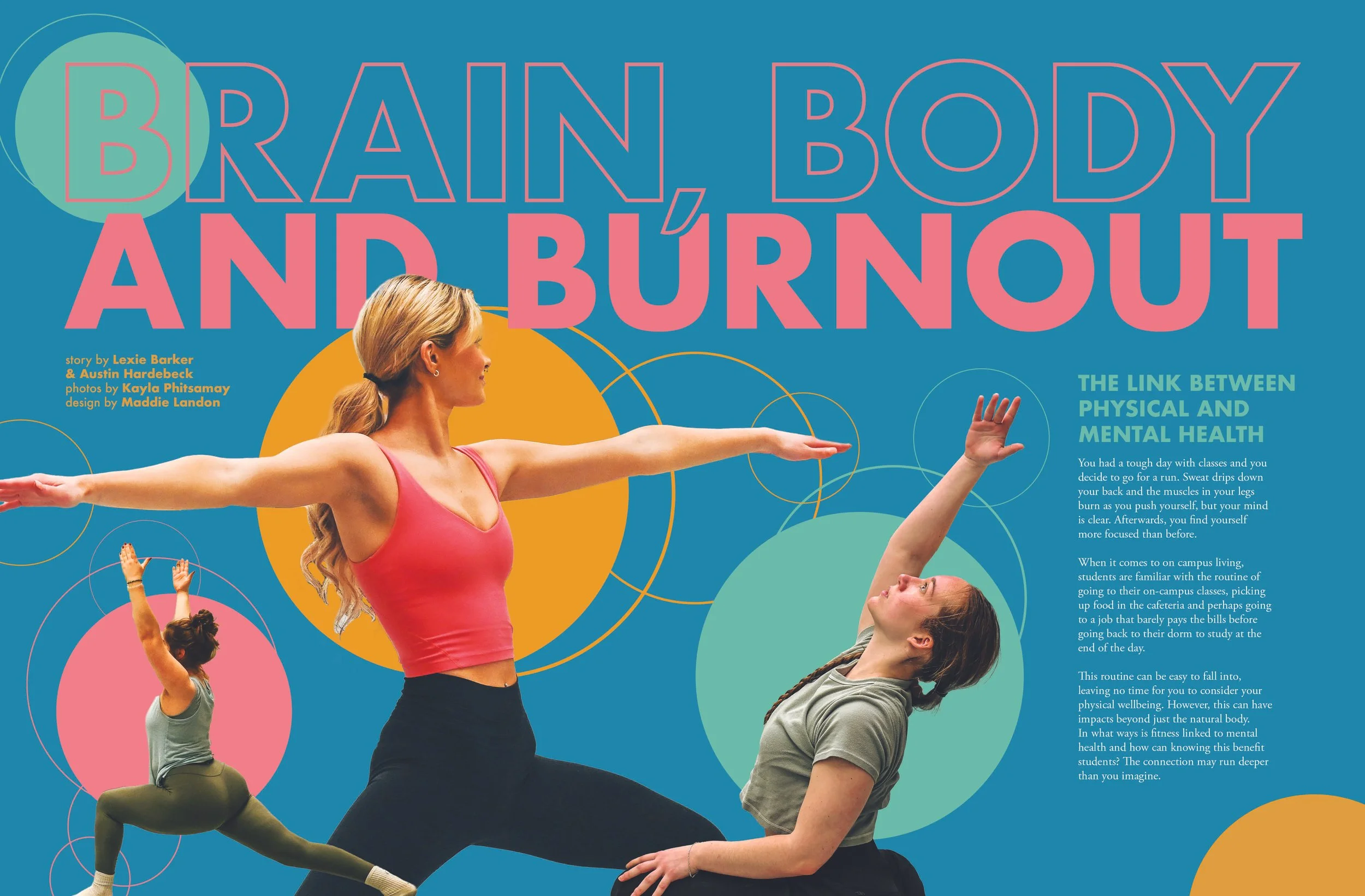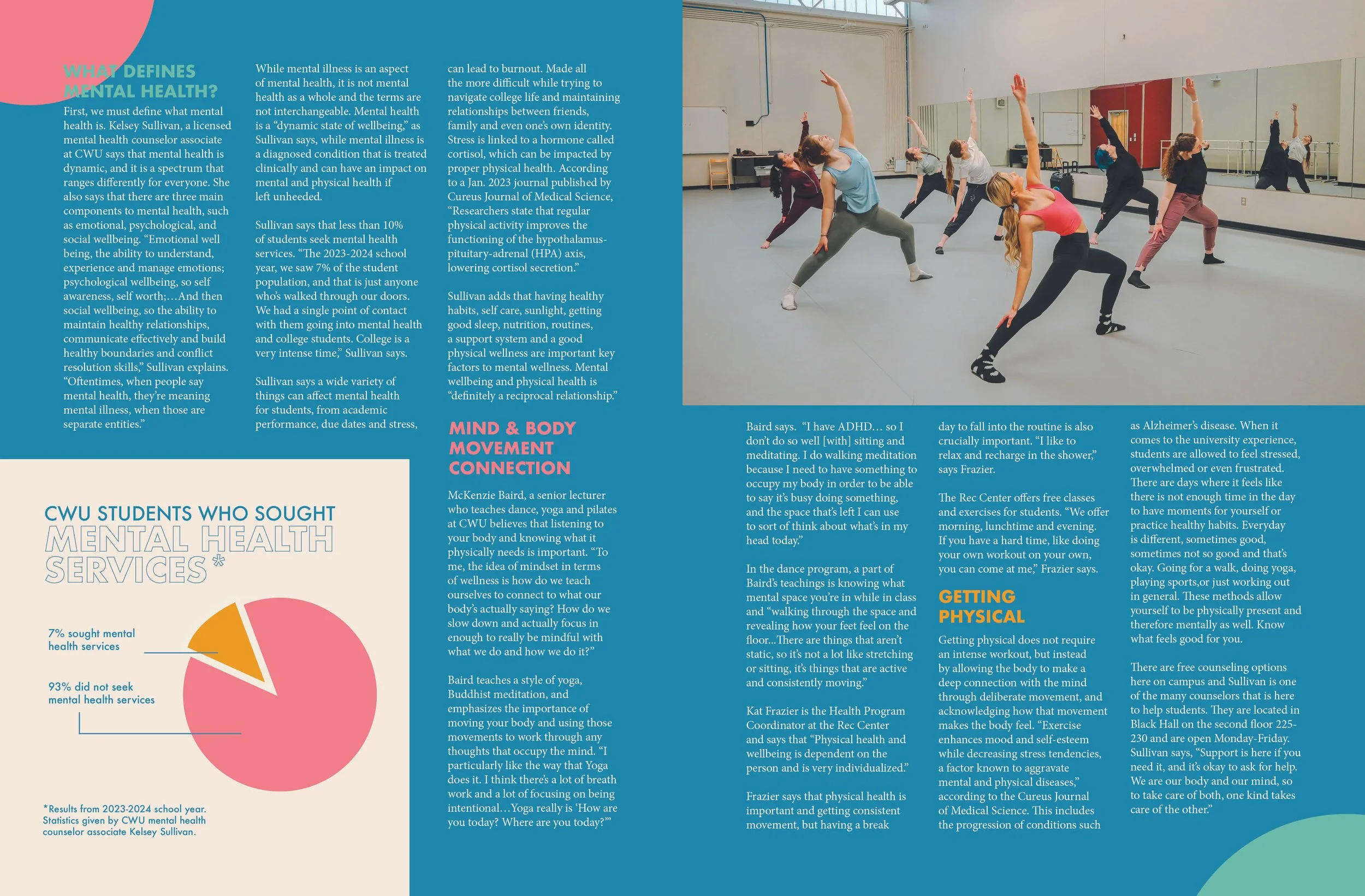Brain, Body and Burnout: The Link Between Physical and Mental Health
story by Lexie Barker & Austin Hardebeck, photography by Kayla Phitsamay, design by Maddie Landon
You had a tough day with classes and you decide to go for a run. Sweat drips down your back and the muscles in your legs burn as you push yourself, but your mind is clear. Afterwards, you find yourself more focused than before.
When it comes to on campus living, students are familiar with the routine of going to their on-campus classes, picking up food in the cafeteria and perhaps going to a job that barely pays the bills before going back to their dorm to study at the end of the day.
This routine can be easy to fall into, leaving no time for you to consider your physical wellbeing. However, this can have impacts beyond just the natural body. In what ways is fitness linked to mental health and how can knowing this benefit students? The connection may run deeper than you imagine.








What Defines Mental Health?
First, we must define what mental health is. Kelsey Sullivan, a licensed mental health counselor associate at CWU says that mental health is dynamic, and it is a spectrum that ranges differently for everyone. She also says that there are three main components to mental health, such as emotional, psychological, and social wellbeing. “Emotional well being, the ability to understand, experience and manage emotions; psychological wellbeing, so self awareness, self worth;…And then social wellbeing, so the ability to maintain healthy relationships, communicate effectively and build healthy boundaries and conflict resolution skills,” Sullivan explains. “Oftentimes, when people say mental health, they’re meaning mental illness, when those are separate entities.”
While mental illness is an aspect of mental health, it is not mental health as a whole and the terms are not interchangeable. Mental health is a “dynamic state of wellbeing,” as Sullivan says, while mental illness is a diagnosed condition that is treated clinically and can have an impact on mental and physical health if left unheeded.
Sullivan says that less than 10% of students seek mental health services. “The 2023-2024 school year, we saw 7% of the student population, and that is just anyone who’s walked through our doors. We had a single point of contact with them going into mental health and college students. College is a very intense time,” Sullivan says.
Sullivan says a wide variety of things can affect mental health for students, from academic performance, due dates and stress, can lead to burnout. Made all the more difficult while trying to navigate college life and maintaining relationships between friends, family and even one’s own identity. Stress is linked to a hormone called cortisol, which can be impacted by proper physical health. According to a Jan. 2023 journal published by Cureus Journal of Medical Science, “Researchers state that regular physical activity improves the functioning of the hypothalamus-pituitary-adrenal (HPA) axis, lowering cortisol secretion.”
Sullivan adds that having healthy habits, self care, sunlight, getting good sleep, nutrition, routines, a support system and a good physical wellness are important key factors to mental wellness. Mental wellbeing and physical health is “definitely a reciprocal relationship.”
















Mind and Body Movement Connection
McKenzie Baird, a senior lecturer who teaches dance, yoga and pilates at CWU believes that listening to your body and knowing what it physically needs is important. “To me, the idea of mindset in terms of wellness is how do we teach ourselves to connect to what our body’s actually saying? How do we slow down and actually focus in enough to really be mindful with what we do and how we do it?”
Baird teaches a style of yoga, Buddhist meditation, and emphasizes the importance of moving your body and using those movements to work through any thoughts that occupy the mind. “I particularly like the way that Yoga does it. I think there’s a lot of breath work and a lot of focusing on being intentional…Yoga really is ‘How are you today? Where are you today?’” Baird says. “I have ADHD… so I don’t do so well [with] sitting and meditating. I do walking meditation because I need to have something to occupy my body in order to be able to say it’s busy doing something, and the space that’s left I can use to sort of think about what’s in my head today.”
In the dance program, a part of Baird's teachings is knowing what mental space you’re in while in class and “walking through the space and revealing how your feet feel on the floor...There are things that aren’t static, so it’s not a lot like stretching or sitting, it’s things that are active and consistently moving.”
Kat Frazier is the Health Program Coordinator at the Rec Center and says that “Physical health and wellbeing is dependent on the person and is very individualized.”
Frazier says that physical health is important and getting consistent movement, but having a break day to fall into the routine is also crucially important. “I like to relax and recharge in the shower,” says Frazier.
The Rec Center offers free classes and exercises for students. “We offer morning, lunchtime and evening. If you have a hard time, like doing your own workout on your own, you can come at me,” Frazier says.
Getting Physical
Getting physical does not require an intense workout, but instead by allowing the body to make a deep connection with the mind through deliberate movement, and acknowledging how that movement makes the body feel. “Exercise enhances mood and self-esteem while decreasing stress tendencies, a factor known to aggravate mental and physical diseases,” according to the Cureus Journal of Medical Science. This includes the progression of conditions such as Alzheimer’s disease.
When it comes to the university experience, students are allowed to feel stressed, overwhelmed or even frustrated. There are days where it feels like there is not enough time in the day to have moments for yourself or practice healthy habits. Everyday is different, sometimes good, sometimes not so good and that’s okay. Going for a walk, doing yoga, playing sports,or just working out in general. These methods allow yourself to be physically present and therefore mentally as well. Know what feels good for you.
There are free counseling options here on campus and Sullivan is one of the many counselors that is here to help students. They are located in Black Hall on the second floor 225-230 and are open Monday-Friday. Sullivan says, “Support is here if you need it, and it’s okay to ask for help. We are our body and our mind, so to take care of both, one kind takes care of the other.”


